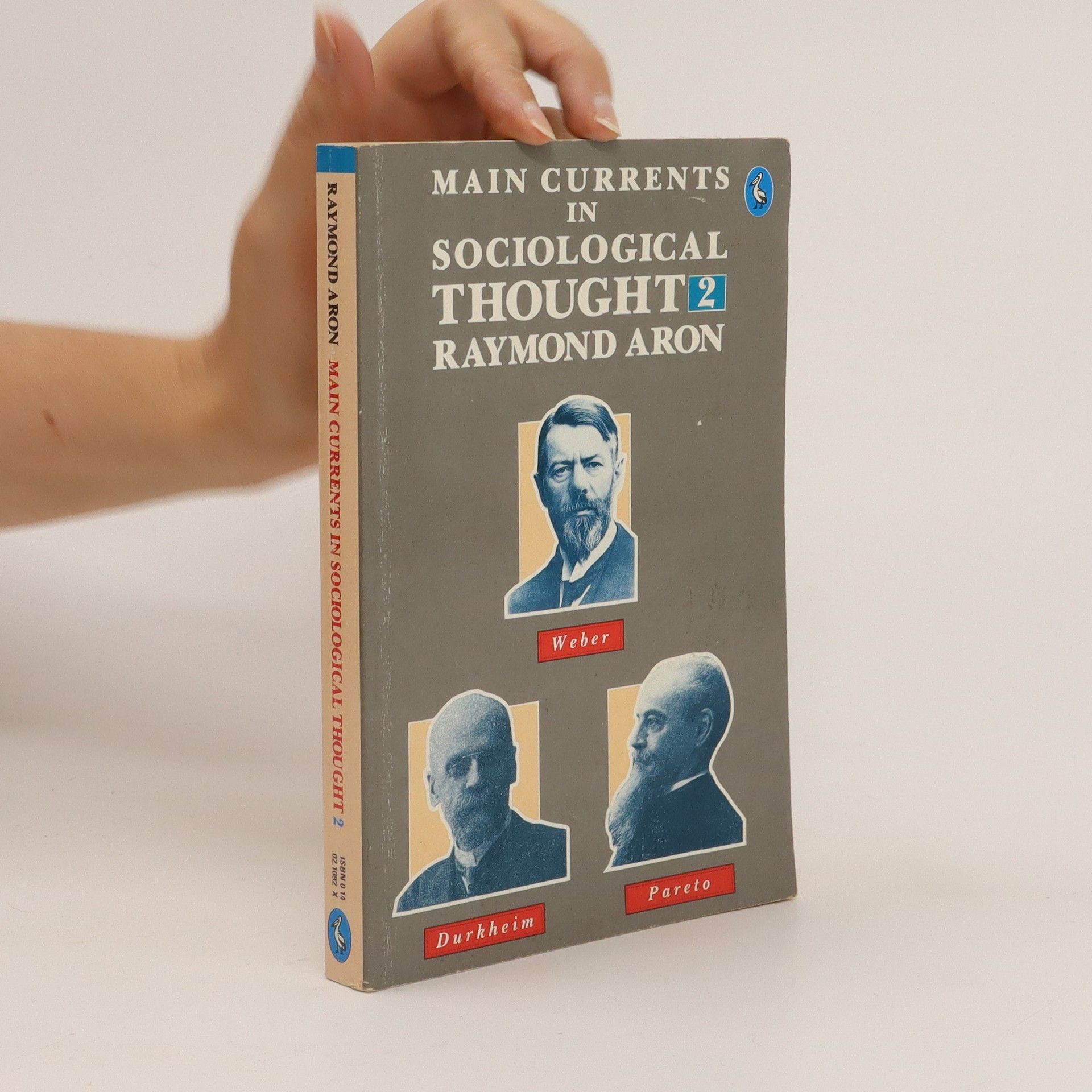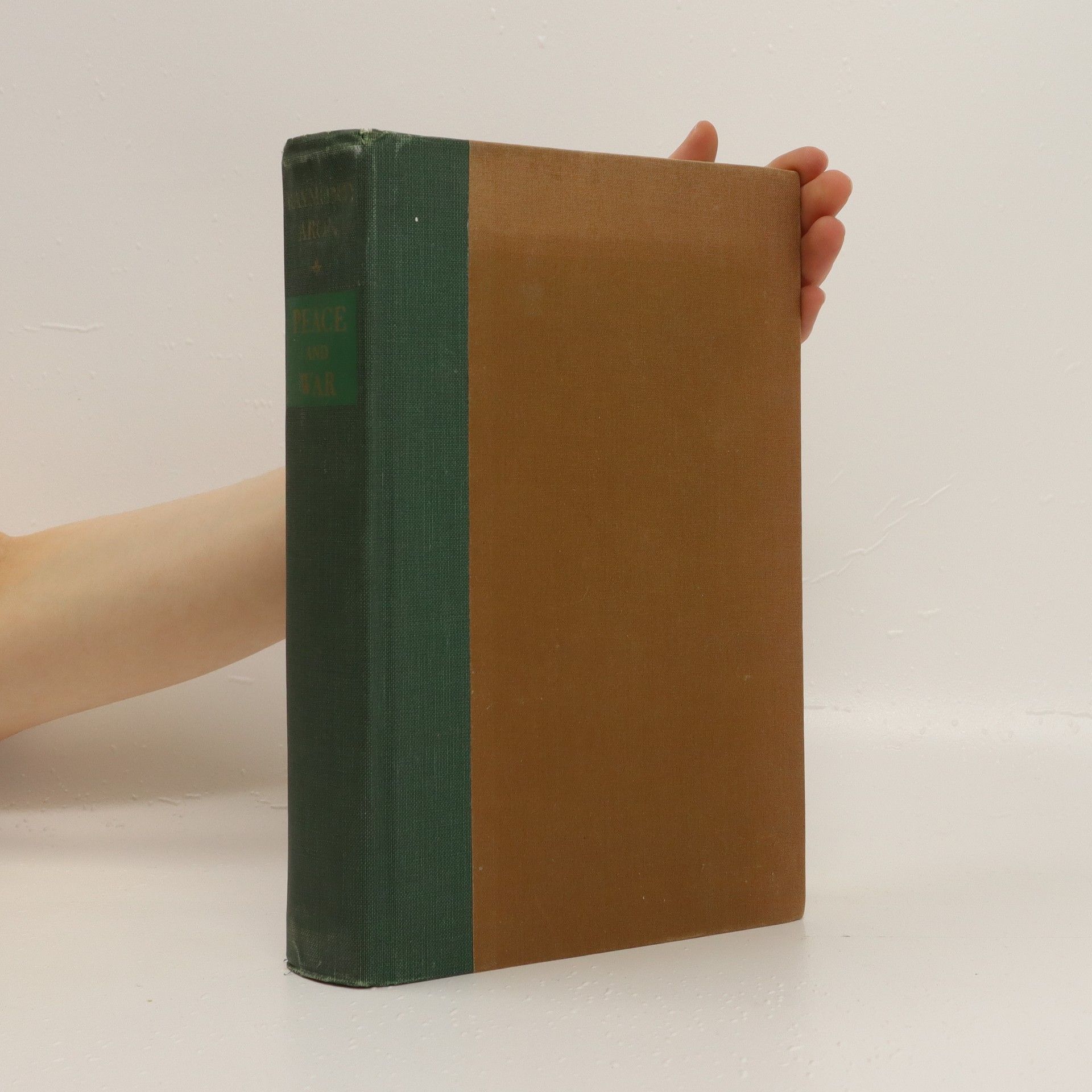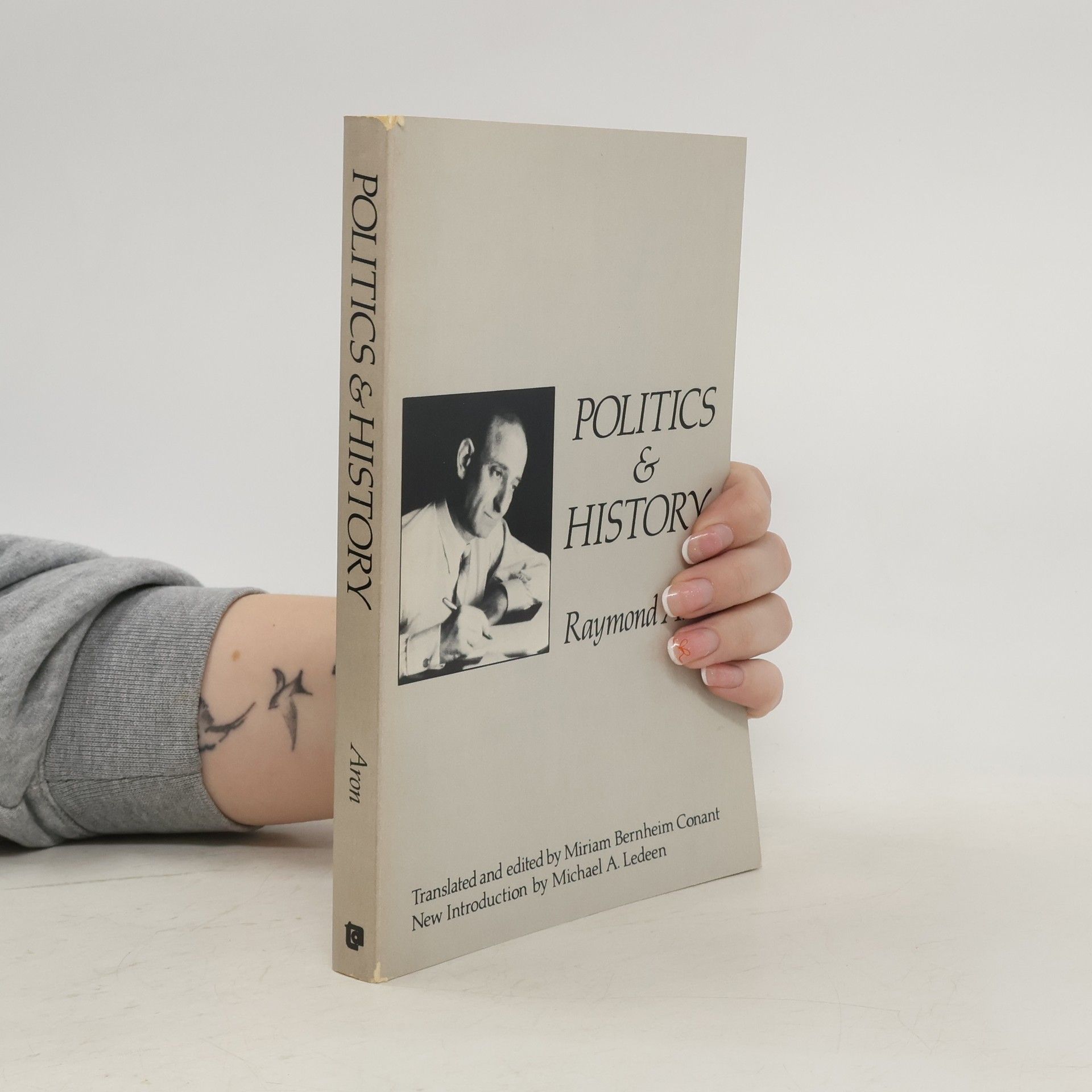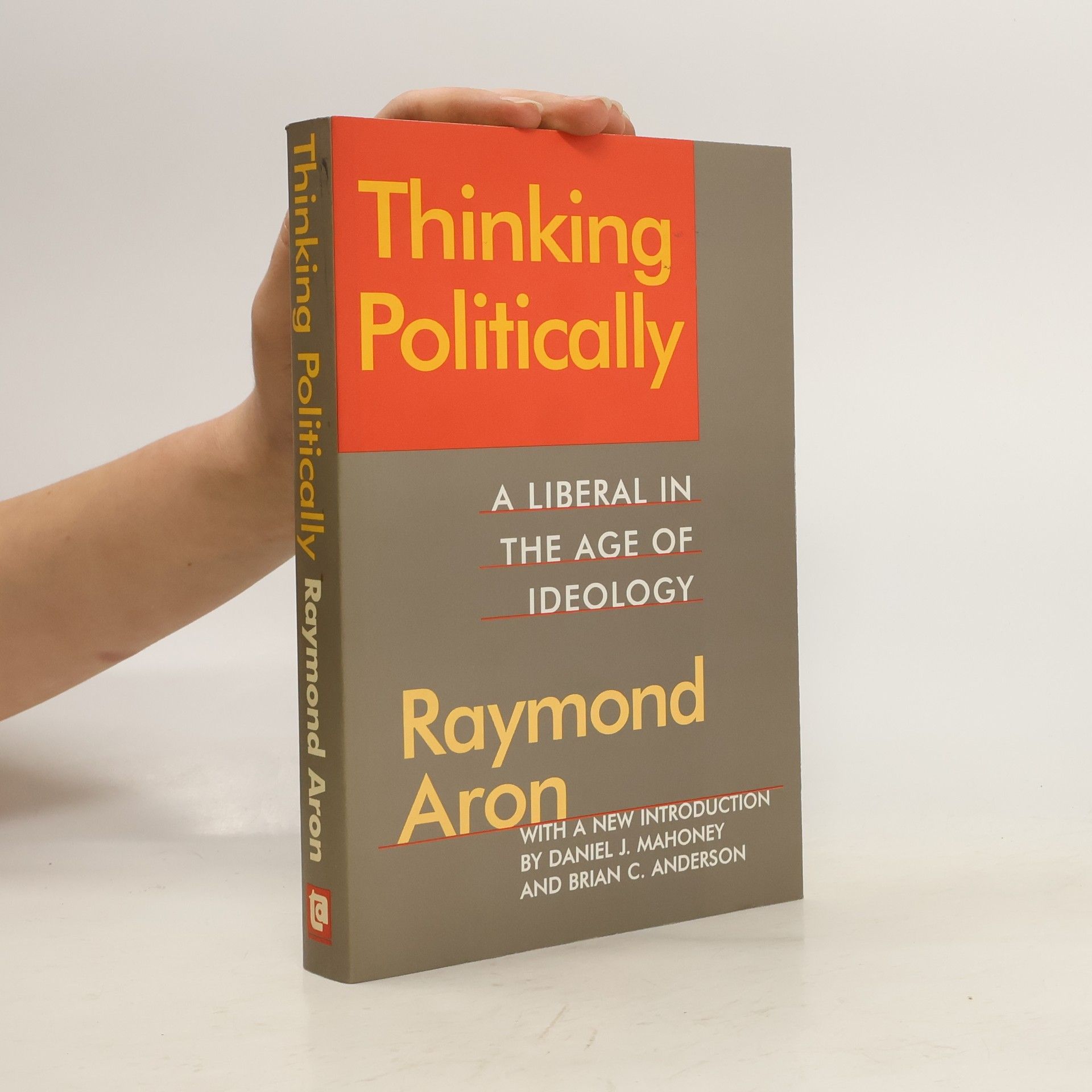In this important work, the most prominent French liberal intellectual of the Cold War era presents his views on the core values of liberal democracy: liberty and equality. At the same time, he provides an ideal introduction to key aspects of his thought
Raymond Aron Book order (chronological)
Raymond Aron was a French philosopher, sociologist, journalist, and political scientist whose work critically examined the influence of intellectual thought on political ideologies. He is renowned for his seminal book, 'The Opium of the Intellectuals,' where he analyzed how Marxism in post-war France swayed intellectuals towards defending oppressive regimes while overlooking the flaws of capitalism and democracy. Aron's writing is characterized by its sharp analysis and rational approach to complex social and political phenomena. His extensive writings across various topics solidified his position as a significant voice in 20th-century intellectual discourse.







Sie ist wieder da! Die Risse sind geschlossen. Irth ist nicht mehr länger gefährdet. Und doch hält der Frieden die Menschen nicht davon ab, sich wie Idioten zu verhalten. Als eine routinemäßige Versorgungsfahrt in einen Kampf ausartet, müssen Hannah und ihr treues Team von Kriegerinnen und Kriegern den Mord an einem König aufklären, bevor sein Königreich in Stücke gerissen wird. Aber es gibt Leute im Königreich, die vor nichts zurückschrecken, um sicherzustellen, dass der Mord ein Geheimnis bleibt. Die Solyrianische Verschwörung folgt den epischen Abenteuern der stärksten Magierin der Welt, die ihre Macht nutzt, um Irth wieder Gerechtigkeit zu bringen.
Was dich nicht umbringt, macht dich stärker. Lilith liegt im Sterben. Die Lachende Königin ist im Anmarsch. Eine Reihe von mysteriösen Verschwundenen plagt New Romanov. Gut, dass das Team BBB an dem Fall dran ist. Um die Menschen, die sie liebt, zu retten, muss Hannah ihre magischen Fähigkeiten bis an die Grenze ausreizen. Aber was, wenn sie dabei zu weit geht? ***Reborn ist der epische Abschluss des zweiten Handlungsbogens von Aufstieg der Magie, einer Seitenserie aus dem Universum des Kurtherianischen Gambits. Es ist ein Wettlauf gegen die Zeit, der das Gefüge von Irth verändern und Türen öffnen wird, von denen Hannah nicht einmal wusste, dass sie existieren. ***
The book offers a profound re-evaluation of Carl von Clausewitz, highlighting him not just as a military strategist but as a significant political philosopher. Professor Raymond Aron, a prominent French social scientist, explores Clausewitz's influence on various aspects of contemporary society, emphasizing his enduring relevance in understanding the interplay between war and politics. This edition, first published in 1983, invites readers to reconsider Clausewitz's contributions beyond traditional military studies.
»Egal was passiert«, sagte sie, »der morgige Tag endet mit Blut.« Adriens Masterplan wurde enthüllt und die Schlachtlinien sind gezogen. Die Asche des Boulevards liegt noch in der Luft und Hannah und ihr Team müssen sich beeilen, um ihre zusammengewürfelte Armee vorzubereiten, bevor die ganze Macht von Arcadia über sie hereinbricht. Während Karl seine Truppen in Form bringt, dringt Parker in den Bauch der Bestie ein und Hannah sowie Ezekiel gehen getrennte Wege, um Hilfe zu suchen. Sie haben sich zur Wehr gesetzt, aber können sie den Krieg gewinnen? Revolution bringt den ersten Handlungsbogen der Serie Aufstieg der Magie zu einem explosiven Ende, das endlich jahrzehntealtes Unrecht wieder gut macht und die Frage nach Gut und Böse beantwortet. Dies ist eine actiongeladene Geschichte, gefüllt mit Herz, Humor und dem nie endenden Streben nach Gerechtigkeit, angsiedelt in der fernen Zukunft der Welt des Kurtherianischen Gambits.
Rebellion
- 367 pages
- 13 hours of reading
Wenn man Tyrannei sät, sollte man besser darauf vorbereitet sein, die Rebellion zu ernten. Hannah und Ezekiel graben sich tiefer in die Korruption des Adelsviertels ein und die kranke Wahrheit von Adriens Masterplan wird klar. Sie müssen die verschiedenen Gruppen derer, die der Sache treu sind, zusammenrufen, um die Schreckensherrschaft des Kanzlers zu stoppen bevor noch mehr Unschuldige durch seine Hand sterben. In der Zwischenzeit werben Karl und Parker einen mächtigen Verbündeten an, der ihnen im Kampf gegen die Lügen des Propheten hilft, während sich Gregory auf etwas vorbereitet, das weitaus gefährlicher ist als eine Schlacht ein feierlicher Ball im Haus seiner Eltern. Manchmal haben die Rebellen den ganzen Spaß. Rebellion zeigt die Helden von Irth in Aktion, wie sie gegen die Tyrannei kämpfen und daran arbeiten, das Böse in die Schranken zu weisen. Hannah und ihre Freunde müssen die Kraft der Teamarbeit lernen, um die Gefahren des unkontrollierten Ehrgeizes zu verhindern.
Auch Helden brauchen mal Urlaub. Leider haben sich Hannah und ihre Freunde den falschen Strand ausgesucht. Das Orakel braucht Hilfe. Sie liegt im Sterben, und nur Ezekiel weiß, dass die Welt mit ihr sterben wird. Hannah und ihr Team nehmen den Ruf ohne zu zögern an. Das einzige Problem? Es dauert verdammt lange, die Welt zu durchqueren. Während sie ihre Suche für eine dringend benötigte Pause und neue Vorräte unterbrechen, werden Karl, Hadley und Laurel von einigen wütenden Einheimischen gefangen genommen, die sie beschuldigen, den Sohn ihres Anführers entführt zu haben. Hannah und Parker machen sich auf den Weg zur Rettung und lassen Gregory allein zurück, um das Luftschiff auf einer von Rücklingen verseuchten Bergkuppe zu bewachen. Was kann da schon schiefgehen? Die Passage der Ungesetzlichen erkundet das magische Land Irth jenseits des des Tales von Arcadia. Es ist ein schnelles und lustiges Abenteuer, das dich garantiert bis zum Ende zum Lachen und dich zum Mitfiebern bringt.
Die größten Geheimnisse der Magie werden endlich gelüftet. Nach wochenlanger Reise an Bord der Ungesetzlichen erreichen Hannah und ihre Freunde der Bitch-und-Bastard-Brigade ihr Ziel in der hintersten Ecke der bekannten Welt. New Romanov. Die Heimat des Orakels. Und sie kommen keinen Augenblick zu früh, als die bösen Mächte, die Irth vernichten wollen, einen weiteren Angriff starten. Hannahs neuer Feind ist größer und bösartiger als alles, was ihr bisher begegnet ist, und es braucht die ganze Kraft ihres Teams und mehr um ihn zu stoppen. Ein ganz gewöhnlicher Tag in der außergewöhnlichen Welt des Zeitalters der Magie, einer Seitenserie aus dem Kurtherianischen Gambit.
»Jede ausreichend fortgeschrittene Technologie ist von Magie nicht zu unterscheiden...« Arthur C. Clarke Sie wollte keine Magie benutzen. Sie wusste nicht einmal, dass sie Magie hatte. Sie wollte nur ihren Bruder retten, der in ihren Armen im Sterben lag. Angeklagt, illegale Magie benutzt zu haben, und zu einem grausamen Tod durch die Wachen der Stadt verurteilt, hat Hannah keine andere Wahl, als auf die Hilfe eines seltsamen, alten Mannes zu vertrauen, der unvorstellbare Macht ausübt. Der Gründer ist zurückgekehrt, um die Ungerechtigkeiten zu korrigieren. Aber dazu braucht er Hannah, eine junge Frau aus den Slums der Stadt. Sie hat einen Schlüssel, um eine Macht freizusetzen, die noch größer ist als seine eigene wenn sie nur lernen kann, sich selbst und der Magie, die in ihrem Blut fließt, zu vertrauen. Auf der Grundlage der Kurtherianischen Gambit-Serie erzählt Unterdrückung eine völlig neue Geschichte im Zeitalter der Magie, weit nachdem Bethany Anne die Erde verlassen hat und von den Helden und Schurken, die um die Kontrolle über ihr Schicksal kämpfen.
Rache ist ein Gericht, das am besten mit Magie serviert wird und einem Drachen als Haustier. Hannah hat die getötet, die ihre Familie zerstört haben, aber der Mann, der ihren Tod befohlen hat, ist noch am Leben und an der Macht. Es ist an der Zeit, dass jemand daran arbeitet, Adriens bösartige Herrschaft zu beenden. Aber um Gerechtigkeit zu finden, muss Hannah ihre Fähigkeiten verbessern. Sie und Sal gehen in die Heights, um ein kleines Einzeltraining mit einem gutaussehenden, jungen Mystiker zu absolvieren, während Ezekiel nach Norden aufbricht, um ein vierzig Jahre altes Unrecht zu korrigieren. Währenddessen steckt Parker in der Scheiße, die nach Hannahs Arschtreten hinterlassen wurde. Er muss sich gegen eine Gruppe von magiefeindlichen Fanatikern zur Wehr setzen und das Geheimnis einer neuen Fabrik aufdecken, deren Arbeiter nie wieder gesehen oder von ihnen gehört werden. Der Alptraum ist real, aber ein Wiedererwachen ist im Anmarsch.